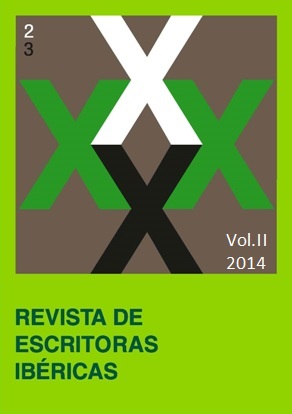Negotiating censorship in the postwar spanish novel divorce and civil marriage in Elena Quiroga’s algo pasa en la calle (1954)
DOI:
https://doi.org/10.5944/rei.vol.2.2014.12949Palabras clave:
Censura, divorcio, Elena QuirogaResumen
n recent years, the postwar Spanish novel has received
relatively little critical attention, with much scholarship focusing instead on
more contemporary works that deal with the Civil War and its legacy. My
argument in this article is premised on the notion that works produced in
1950s and 1960s Spain merit renewed scholarly attention and a fresh critical
approach. I focus my discussion on the works of novelist Elena Quiroga,
whose works have been the focus of little scholarly attention and are
generally not well-known by the reading public. My discussion considers the
reasons for this neglect of Quiroga and her works, examining her narrative
style and her treatment of highly contentious issues in her works, despite
the strict censorship regime in place in postwar Spain. My analysis centres
on Algo pasa en la calle, Quiroga’s most experimental novel of the 1950s in
terms of technique, and also the most daring in terms of social criticism. I
examine the author’s representation of the contentious issue of divorce and
civil marriage, and her subversion of the gendered identities prescribed in
Franco’s Spain.
Descargas
Descargas
Publicado
Cómo citar
Número
Sección
Licencia
Los autores que publican en esta revista están de acuerdo con los siguientes términos:
Los autores conservan los derechos de autor y garantizan a la revista el derecho de ser la primera publicación del trabajo.
La revista Revista de Escritoras Ibéricas se publica bajo licencia Creative Commons Reconocimiento – NoComercial (CC BY-NC). Las opiniones y contenidos de los artículos publicados la Revista de Escritoras Ibéricas son de responsabilidad exclusiva de los autores y no comprometen la opinión y política científica de la revista. También serán responsables de proporcionar copias de los datos en bruto, puntuaciones, y, en general, material experimental relevante a los lectores interesados.
Los autores pueden establecer por separado acuerdos adicionales para la distribución no exclusiva de la versión de la obra publicada en la revista (por ejemplo, situarlo en un repositorio institucional o publicarlo en un libro), con un reconocimiento de su publicación inicial en esta revista.Se permite y se anima a los autores a difundir sus trabajos electrónicamente (por ejemplo, en repositorios institucionales o en su propio sitio web) antes y durante el proceso de envío, ya que puede dar lugar a intercambios productivos, así como a una citación más temprana y mayor de los trabajos publicados (Véase The Effect of Open Access) (en inglés).







